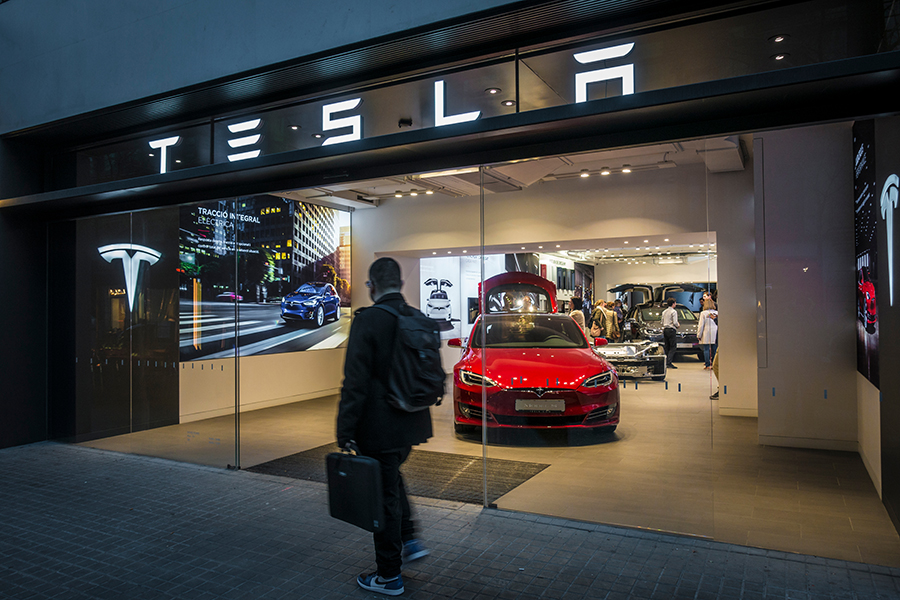Tesla Posts $105 Million Profit for Quarter, Extending Rebound
Tesla's shares ended regular trading on Wednesday at $580.99, a record closing price. Still, investors remain deeply divided over the company's value


 Image: Shutterstock[br]Tesla said Wednesday that it turned a profit in the fourth quarter of 2019 and was ahead of schedule on its latest model, offering renewed confidence as it enters what could be a pivotal year.
Image: Shutterstock[br]Tesla said Wednesday that it turned a profit in the fourth quarter of 2019 and was ahead of schedule on its latest model, offering renewed confidence as it enters what could be a pivotal year.
The electric-car maker reported $105 million in net income for the quarter. Although that figure was down from the $143 million it reported for the previous quarter, investors were far from daunted. Tesla’s shares rose 12% in after-hours trading.
The numbers suggest that Tesla has overcome the problems that plagued it in the first half of last year, when it lost more than $1 billion and scrambled to raise capital.
Tesla, which has never had a profitable year, ended 2019 with a loss of $862 million, less than its two previous annual losses.
Revenue was $7.4 billion in the fourth quarter, the company said, up from $6.3 billion in the third quarter. It said it expected to “comfortably exceed” 500,000 vehicle deliveries this year, about a third more than in 2019.
Tesla also said it had begun ramping up production of the Model Y at its factory in Fremont, California, with deliveries expected by the end of March, well ahead of a previous estimate for the fall. In a call with analysts after the results were released, Elon Musk, Tesla’s chief executive, said that he was confident the vehicle would find buyers and that the company was focused on building out supply.
“We’re not too worried about demand,” he said. “We’re worried about production.”
Tesla’s shares ended regular trading on Wednesday at $580.99, a record closing price. Still, investors remain deeply divided over the company’s value, which has more than doubled in recent months to eclipse the market capitalizations of Volkswagen, Ford, General Motors and other established automakers. Some predict that Tesla will dominate the growing market for electric vehicles while others question both the size of that market and Tesla’s ability to ward off competition.
Tesla’s pursuit of a global expansion rests largely on the success of a new factory in Shanghai, which this month began regular delivery of vehicles built there. The company is also building a factory outside Berlin, bringing the fight for the electric vehicle market to the backyard of some of the world’s largest automakers. Deliveries from that factory are expected to begin next year.
Tesla’s global push isn’t without its risks.
Production at the Shanghai factory is expected to be delayed by as much as a week and a half because of an official shutdown that has affected many businesses in response to the spread of the coronavirus, Tesla’s chief financial officer, Zach Kirkhorn, told the analysts.
As the electric-vehicle market grows, legacy carmakers and startups are also shoveling cash into making and marketing their own models. Fading tax credits in multiple countries may also depress Tesla’s sales. And the company could even become a victim of its own success.
Tesla has become a major target of short-sellers, who hope to profit off what they see as an inevitable decline in the stock price. On social media, those short-sellers and other critics amplify reports of accidents involving unintended acceleration or the Autopilot driver-assistance system, along with other negative Tesla news.
Some of those issues have also caught the eye of federal investigators, with the National Highway Traffic Safety Administration looking into at least 14 crashes in which it believes Autopilot was engaged. The National Transportation Safety Board is meeting next month to look into one such accident in Mountain View, California, in 2018.
Still, the company has so far been successful at defying its critics, overcoming the struggles of early 2019 to finish construction on the Shanghai factory on the company’s own aggressive timeline and deliver 367,500 vehicles for the year, on the low end of a promised range of 360,000 to 400,000. That progress elicited something of a mea culpa in a note on Wednesday from analysts at Bank of America, who acknowledged a “rude awakening.”
Despite calling Tesla a “trailblazer,” the Bank of America analysts still count themselves among the pessimists and argue that the stock, which trades under the ticker symbol TSLA, is overvalued by at least $200.
“We believe investor optimism about TSLA’s addressable market for electric vehicles, volume growth trajectory and, most importantly, sustainable profits/cash flow inflection is overblown,” they wrote before the quarterly results were released.
Tesla said it expected to remain profitable going forward, “with possible temporary exceptions.” It ended 2019 with $6.3 billion in cash and cash equivalents, a 70% increase from the year before.
In addition to overseas growth, Tesla’s success this year is likely to be defined by the rollout of the Model Y, which will have an estimated range of 315 miles per charge, up from a previous estimate of 280 miles, the company said on Wednesday. The introduction of the relatively affordable Model 3 last year led Tesla to a record number of deliveries in the fourth quarter, accounting for about 80% of vehicles sold in that period.
First Published: Jan 30, 2020, 11:43
Subscribe Now